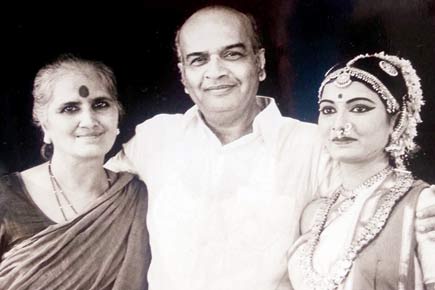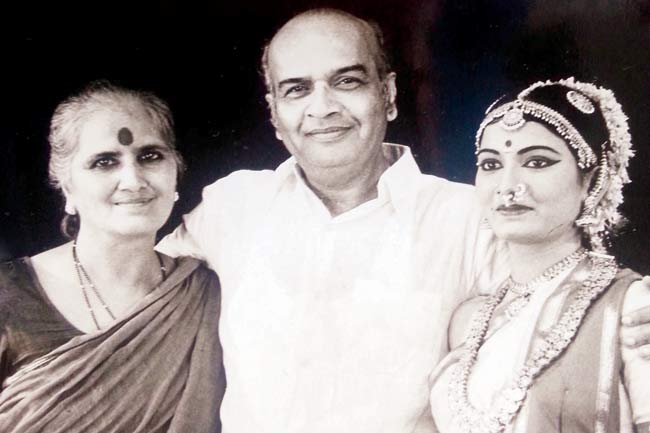In her new monthly column, Meher Marfatia explores Mumbai's journey down the decades

Malatiben Jhaveri with husband Damubhai and Bharatnatyam dancer daughter, Parul. PHOTO COURTESY/PARUL SASTRI
 Those kohl-lined eyes will flash no more beneath the trademark big, bright bindi.
Those kohl-lined eyes will flash no more beneath the trademark big, bright bindi.
With 92-year-old Malati Jhaveri passing away last week, the city loses an iconic figure.
ADVERTISEMENT
One of its oldest freedom fighters, theatre thespian, textile conservationist, photographer, mountain trekker and nature lover, multi-faceted Malatiben was all these and more.
She still made the feistiest picture when we met a fortnight ago in her Babulnath home dotted with images of Gandhiji and Ganesha, looking just a little feebler than I remembered her earlier in the year. “Beta, tu toh maneh bhuli gayi (you’ve forgotten me)!” she chided gently. I could drop in on her at any hour of the day without asking “Will you be resting?” Despite painful arthritis, daytime naps were strictly no-no. They cut into hours spent translating classic epics from Hindi to Gujarati with meticulous zest. My nonagenarian friend finished 20 such books, taking the occasional break when her dancer daughter Parul visited from Bangalore.

Malatiben Jhaveri with husband Damubhai and Bharatnatyam dancer daughter, Parul. PHOTO COURTESY/PARUL SASTRI
Over hot thali lunch at her dining table she would reminisce, “We were blessed, born at the right time in this country led by our guru, Gandhiji. Inspired by him, we wanted to defy the excesses of the Raj. Women like me then referred to prison as ‘saasre’ (Gujarati for in-laws’ residence), our second home.” She should know, jailed three times in 1942 alone.
Growing up in the Nepean Sea Road family mansion of her silk merchant father, Sir Shantidas Askuran, Malatiben dropped Sanskrit studies at St Xavier’s College to devotedly join the Independence struggle. On August 8, 1942 she wore the red khadi sari given to volunteers attending the explosive Congress session at the Gowalia Tank green soon to be christened August Kranti Maidan. As Aruna Asaf Ali hoisted the Congress flag, a charged Malatiben earned a precious personal victory. Teargas was released for the first time in India. When a piece of shell fell on her, she lobbed it right back at a British soldier. Burnt but triumphant, she was whisked off to jail, where she even won police sympathy on bursting into nationalistic songs.
The same fierce rootedness made Malatiben work hard to promote indigenous textiles. Her sister Prabha Shah and she set up the Sohan Sahkari Sangh, a pioneering effort in the non-government sector to create a thriving market for handlooms and handicrafts. They ran Sohan for over 40 years with rare sensitivity for discerning and developing design within a cooperative network.
But her abiding passion was theatre, which she flung herself into with typical fiery energy. The constitution of the Indian National Theatre (INT) was cradled in prison, inked by patriots like Malatiben’s husband Damu Jhaveri, Chandrakant Dalal, Rohit Dave and Mansukh Joshi. Confident the country was on the verge of liberation, they were keen to script its fresh cultural policy. On May 5, 1944 (Iqbal Day commemorating the poet who composed Saare jahaan se achha), INT launched to serve the regional performing arts. Damubhai was its dynamic honorary founder and general secretary for 58 long years.
I was privileged to meet Malatiben regularly while researching Laughter in the House, my book on Parsi theatre. Introducing me to INT stalwarts like Gautam Joshi, she was encouragingly excited about it. Her face crinkling in smiles, she recalled the spirited INT partnership with stage stalwarts from Adi Marzban to Burjor Patel.
“Adi Bawa was always more our friend than colleague,” she said, quoting favourite funny lines from their collaborated plays Fasela Ferozeshah, Shirinbai nu Shantiniketan and Mota Dil na Mota Bawa. “Two communities with great talents besides a common language, Gujarati and Parsi drama sparkled to make magic together,” she shared.
Destiny drew us close repeatedly. Another book directing me to her door was an oral history of the Sherpas in Darjeeling. Ardent mountain lover that she was, Malatiben played hostess to those incredible climbers every time they came down to teach courses in 1950s and ’60s Bombay. Nawang Gombu and Tensing Norgay to Dorji Lhatoo and Ajeeba, they all enjoyed her home and hospitality. She in turn was a staunch admirer, declaring: “Brave and loyal to their last breath, the Sherpas were more than human. They don’t make men like them anymore.”
Nor women like you.
RIP Malatiben.
Meher Marfatia loves Mumbai.
And adores Bombay.
Reach her on: mehermarfatia@gmail.com
 Subscribe today by clicking the link and stay updated with the latest news!" Click here!
Subscribe today by clicking the link and stay updated with the latest news!" Click here!







